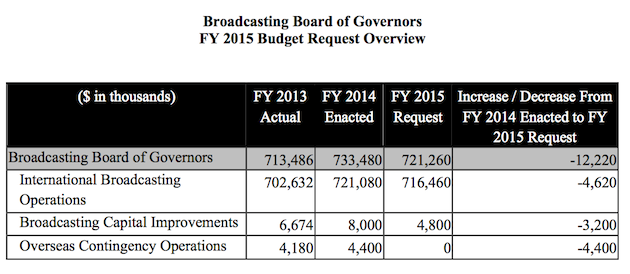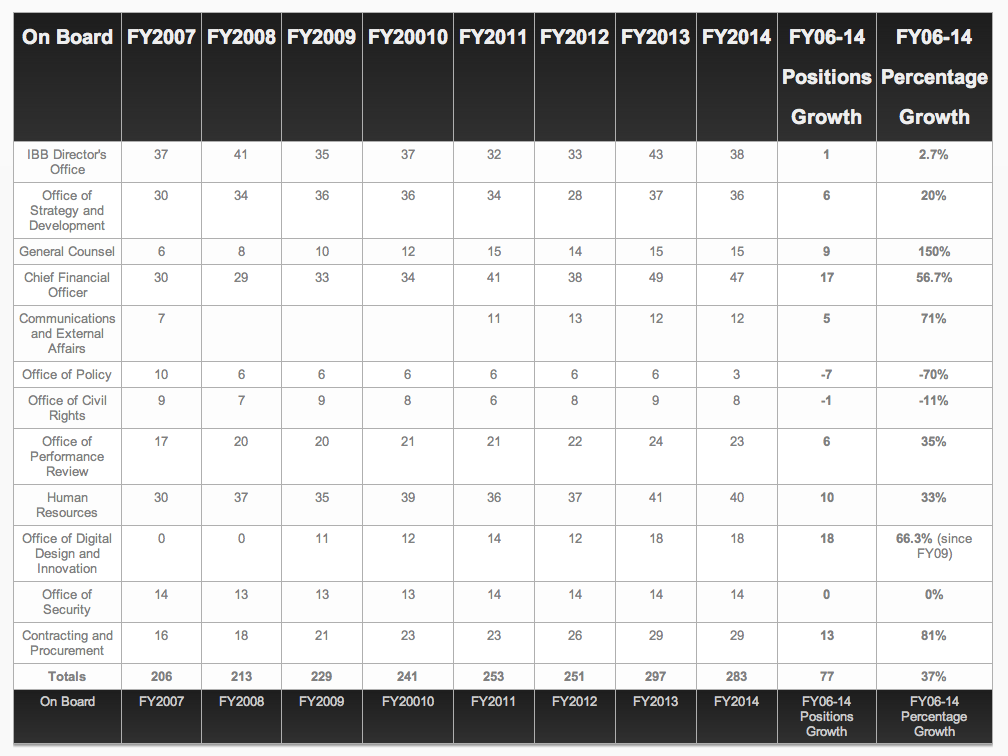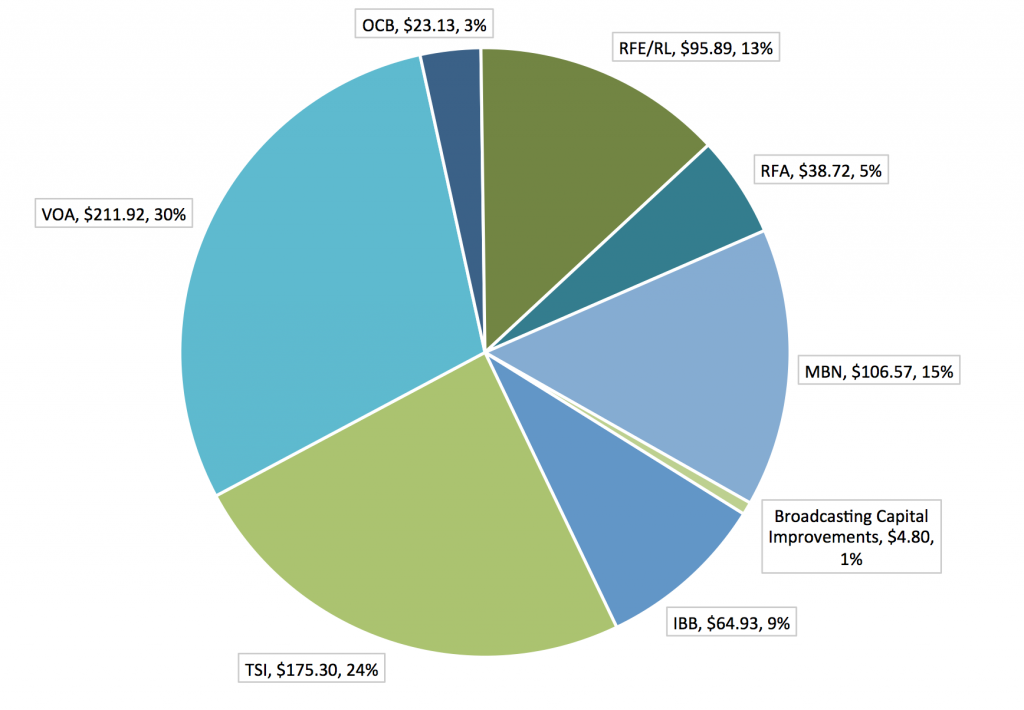BBG Watch Commentary
“Excellence in journalism remains our most important objective.” — BBG Chairman Jeffrey Shell
“What IBB and VOA need before excellence in journalism can be achieved is excellence in management,[… which current] VOA executives certainly cannot provide. — BBG Watch
 U.S. international media funded by U.S. taxpayers is projected to get $12 million less in FY2015. The Broadcasting Board of Governors (BBG) FY2014 enacted budget is: $733,480 million. FY 2015 request is $721,260 million.
U.S. international media funded by U.S. taxpayers is projected to get $12 million less in FY2015. The Broadcasting Board of Governors (BBG) FY2014 enacted budget is: $733,480 million. FY 2015 request is $721,260 million.
This represents $-12,220 million decrease between FY2014 and FY2015 request.
As expected, most of the $12 million cut will come from programming units, programs and programmers, while the vast IBB bureaucracy and support services will still keep 34% of the BBG budget — the largest share among all major entities despite some minor cuts.
International Broadcasting Bureau (IBB) executives also found a clever way to hide, at least optically, how much of the Broadcasting Board of Governors’ U.S. international media budget actually goes to their vast bureaucracy and support services, rather than to entities, units and employees that actually produce programs for foreign audiences. They also made sure that the Broadcasting Board of Governors (BBG) agreed with them to take most of the $12 million cut from programming units rather than from their part of the budget. This happens year after year and explains the 37% growth of IBB positions since FY2007 while the number of programming positions has been drastically cut. The out of control bureacracy keeps growing while news programs to important overseas audiences are being eliminated.
In an attempt to make it look better to American taxpayers and Congress, IBB executives split their share of the budget, by far the largest, between IBB (9%), TSI (24%, which they run and control) and Broadcasting Capital Improvements (1%, which they also control.)
The Office of Technology, Services and Innovation (TSI) is repeatedly referred to in other IBB and BBG documents as an “IBB Office.”
To show TSI in graphs as an entity separate from IBB is clearly a PR deception. “André Mendes directed the IBB’s Office of Technology, Services and Innovation (TSI) for the past four years,” a recent BBG press release said. Mendes now serves as IBB Director of Global Operations. TSI is IBB.
IBB’s share of the FY2015 budget request — the largest within the BBG — is still 34% — $245 million.
VOA comes next with 30%, MBN with 15%, RFE/RL with 13%, RFA with 5%, and OCB with 3%.
Surprisingly, State Department and White House materials on the FY2015 budget request do not show the BBG budget in detail, as they do for other U.S. international programs. Check here for any updates.
Growth of IBB Positions As Numerous Programs and Programming Positions Were Being Cut
It’s no surprise that the most ineffective and mismanaged BBG units — IBB and VOA — take most of the money. Keep in mind that VOA is also a vast bureaucracy, while broadcasters and other programmers are denied resources to do their programs properly and according to the requirements of the VOA Charter.
VOA executives have been wasting U.S. taxpayers’ money on producing multiple news reports and videos on the British royal family, Justin Bieber and even a New York dog show.
This BBG Watch report highlighted below tells it all.
While money flows to IBB, TSI, and VOA executives and their bureaucracies, broadcasters of the VOA Ukrainian Service do not have enough resources to update regularly their website, Facebook page and Twitter page.
On Monday, the day when the fate of Ukraine and geopolitical balance in Eurasia were being decided, VOA Ukrainian Service was not able to update its website 24/7; its Facebook page had not been updated for over a day; its last Twitter entry was more than eight hours old.
As Russian occupation of Ukraine expands — Voice of America Ukrainian Service lacks resources to update Twitter and Facebook, BBG Watch, March 4, 2014
Also read: ‘Hostile Management’ Plagues VOA, Washington DC & Baltimore Area Radio & Television, DCRTV, March 04, 2014.
Quoting from BBG Watch, Dave Hughes writes how “‘Exceptionally bad and hostile management’ is forcing many veteran reporters at the DC-based Voice Of America to quit. Including Dan Robinson, who was the VOA’s former bureau chief in southeast Asia and east Africa and former Congressional and White House correspondent.”
When President Obama made his first major statement on Ukraine last Friday, the VOA news booth at the White House was empty and dark because VOA Director David Ensor and VOA Executive Editor Steve Redisch apparently did not bother to replace Robinson as the situation in Ukraine was exploding. VOA was late to report on the president’s statement, gave it only a few sentences and had no video for many hours. (BBC and Deutsche Welle did.) The VOA Ukrainian Service cannot update its website, Facebook page and Twitter for many hours due to insufficient resources, but IBB/TSI/ODDI with 34% of the BBG budget are busy putting out press releases on digital innovation and new mobile platforms being produced.
IBB constantly brags about new mobile platforms for breaking news. For these platforms to work, news and content have to be produced first by real journalists. (Correction: mobile platform was developed by the Office of Digital and Design Innovation. Both ODDI and TSI and part of IBB.)
Programmers, including those working for VOA’s Ukrainian and Russian services, can’t do their job of delivering news even on free but immensely popular platforms such as Facebook and Twitter if 34% of the agency’s budget goes to the bureaucracy and those who produce new platforms. IBB’s press release about their new phenomenal and pioneering mobile platform, posted on February 27, 2014, shows only 1 (one) Facebook “Like” as of March 4, 2014.
This is the story of most of these new mobile and digital offerings. While they are not bad in themselves, there is very little content to put on them or ability to use them. VOA is badly managed. When Secretary of State John Kerry held his news conference in Kyiv Tuesday, Voice of America did not carry it live on its websites.
The big story is that the overall BBG budget is shrinking. But don’t worry. IBB bureaucrats will make sure that the biggest share still goes to them — 34%, while VOA, OCB, RFE/RL, RFA, and MBN programmers will be once again told to absorb the cuts. Trying to reform the current VOA and IBB management team is like trying to reform Vladimir Putin. They will fight to the end to keep and control what they’ve got and to get what they don’t yet have. Autocracy and government bureaucracy have a lot in common.
We do applaud BBG Chairman Jeff Shell’s statement included in the BBG press release on the FY2015 budget request, especially his emphasis on excellence in journalism. But what IBB and VOA need before excellence in journalism can be achieved is excellence in management, which the current management team, even after recent changes at IBB, cannot provide. VOA executives certainly cannot provide it.
“This agency has a strategic imperative to tie its priorities to global realities, making the most of relatively scarce resources while responding to shifts in audiences, technology use and media markets,” said BBG Chairman Jeffrey Shell. “As we wrestle with difficult budget trade-offs, excellence in journalism remains our most important objective. Hundreds of millions of people around the world count on our journalists for accurate news and information. We are committed to this mission.”
###
BBG Press Release
BBG Budget Request Tied To Global Priorities And Evolving Media Environments
MARCH 4, 2014
WASHINGTON (March 4, 2014) – The Broadcasting Board of Governors (BBG) today announced its FY 2015 budget request, which will help U.S. international media meet strategic priorities in light of dynamic global communications environments and current spending constraints.
“This agency has a strategic imperative to tie its priorities to global realities, making the most of relatively scarce resources while responding to shifts in audiences, technology use and media markets,” said BBG Chairman Jeffrey Shell. “As we wrestle with difficult budget trade-offs, excellence in journalism remains our most important objective. Hundreds of millions of people around the world count on our journalists for accurate news and information. We are committed to this mission.”
For FY 2015, the BBG has requested $721.26 million for U.S. international media to enhance performance and ensure competitiveness in today’s complex media environment. To have the resources and management structures necessary to support innovation and great journalism, the agency must eliminate inefficiencies in its operations. The BBG has embarked on a program of internal reform to improve management effectiveness and to focus resources on core activities.
Proposed investments will target high-priority regions and shifting to more efficient, effective and widely used media in evolving marketplaces. Some specifics include:
- Expand engagement with audiences in Africa – an emerging top priority for U.S. foreign policy – via rapidly expanding television, FM, and digital platforms, especially in the mobile communications arena
- Increase engagement in East and Southeast Asia with video and digital initiatives targeting next-generation audiences, including developing content to support Internet freedom for Burma, Cambodia, China, and Vietnam
- Scale up popular Learning English programs available via broadcasting and online, which have a strong global following as the demand for cost-free English lessons continues to grow
- Build BBG’s newsroom capacity to use digital and mobile platforms in key markets, engage with our worldwide affiliates and develop new digital storytelling and censorship evading tools and techniques for journalists
- Fund Internet anti-censorship efforts to foster the increased deployment of proven anti- censorship tools, the deployment of emerging technologies and partnering with cutting-edge experts, developers and in-country networks
The FY 2015 budget request includes significant reductions in staff positions that are predominantly not tied to content production, as well as costs involving less-effective signal transmissions. The International Broadcasting Bureau and all the BBG-supported networks – Voice of America, Radio Free Europe/Radio Liberty, Radio Free Asia, the Middle East Broadcasting Networks, and the Office of Cuba Broadcasting – will restructure operations in ways to reduce fragmentation, overlap and duplication. Further inefficiencies will be reduced by rationalizing distribution by scaling back some shortwave broadcasts in favor of other distribution methods, such as FM and satellite radio, television, and digital media in places where audiences prefer these newer platforms.
Below is a chart showing how the budget proposal is divided among agency-supported entities. The BBG’s detailed FY 2015 budget request is scheduled to be released in late March.
[BBG Watch Warning — The Original Chart Produced By IBB Is Deceptive — IBB gets and controls 34% of the FY2015 BBG budget (request) – BBG Watch inserted “IBB” to show total IBB budget share in a chart below the BBG press release.]
An overview of the FY2015 budget request is available here.
###




Comments are closed.